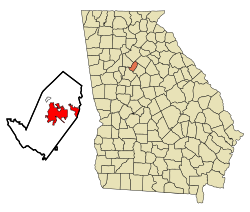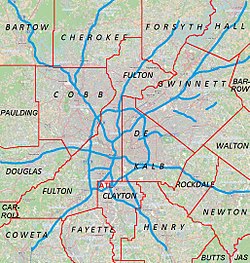Conyers, Georgia
| Conyers, Georgia | |
|---|---|
| City | |

Olde Town Conyers
|
|
| Nickname(s): C Town , Trapdale, Rockistan | |
 Location in Rockdale County and the state of Georgia |
|
| Location of Conyers in Metro Atlanta | |
| Coordinates: 33°39′59″N 84°0′27″W / 33.66639°N 84.00750°WCoordinates: 33°39′59″N 84°0′27″W / 33.66639°N 84.00750°W | |
| Country |
|
| State |
|
| County | Rockdale |
| Area | |
| • Total | 11.9 sq mi (30.9 km2) |
| • Land | 11.8 sq mi (30.5 km2) |
| • Water | 0.1 sq mi (0.4 km2) |
| Elevation | 899 ft (274 m) |
| Population (2009) | |
| • Total | 13,941 |
| Time zone | Eastern (EST) (UTC-5) |
| • Summer (DST) | EDT (UTC-4) |
| ZIP codes | 30012, 30013, 30094 |
| Area code(s) | 470/678/770 |
| FIPS code | 13-19336 |
| GNIS feature ID | 0312910 |
| Website | City of Conyers official website |
Conyers is the only city in Rockdale County, Georgia, United States. It is twenty-four miles east of Atlanta. As of the 2000 census, the city population was 10,689. Census estimates of 2005 indicate a population of 12,205. The city is the county seat of Rockdale County. By 2009, the reported population was 13,941. The formerly separate town of Milstead is now part of Conyers.
Before European settlement, the area which is now Conyers, along with the surrounding county of Rockdale, was occupied by mound-building Native Americans. As time progressed, the Muscogee (or Creek) and Cherokee natives shared a common border here. This border was known as the "Great Indian Road," and is known now as the "Hightower Trail". This trail was used by white settlers following the American Revolution.
Between 1816 and 1821, the area known as Rockdale was open for settlement. John Holcomb, a blacksmith, was the first settler in what is now Conyers. He settled where the current Rockdale County Courthouse is located, in the middle of Conyers on Main Street.
Eventually, there was pressure for a railroad to cross Georgia; the railroad was intended to run from Augusta, through neighboring Covington to Marthasville (now known as Atlanta). John Holcomb was against the railroad and refused to sell his land, and threatened to shoot anyone from the railroad who came onto his property.
Dr. W. D. Conyers, a banker from Covington, eventually persuaded John Holcomb into selling his land for $700. Dr. Conyers then sold the land to the Georgia Railroad. What is now Conyers began as a watering post along this line, named after Dr. Conyers. By 1845, the railroad was in full operation. By 1854, nearly 400 residents lived around the watering post, and Conyers was incorporated.
...
Wikipedia

